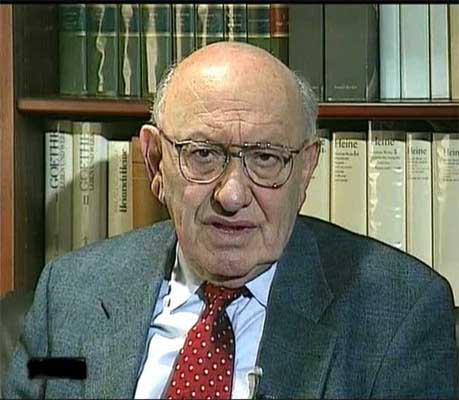Biopic on critic Reich-Ranicki premieres in Europe
 Berlin - Satellite TV viewers in Europe are about to see another side to one of the world's most extraordinary literary figures, an intense, finger-wagging critic whose judgement about new German books has been akin to law for the past 36 years.
Berlin - Satellite TV viewers in Europe are about to see another side to one of the world's most extraordinary literary figures, an intense, finger-wagging critic whose judgement about new German books has been akin to law for the past 36 years.
Marcel Reich-Ranicki, 88, is a bossy, abrasive television personality who is revered as one of Germany's great intellectuals.
But his other story, of his years as a Jewish schoolboy in Nazi Germany and as a member of the resistance keeping one jump ahead of the Holocaust in Poland, is a tale of stark physical peril.
That story has been dramatized in a 90-minute, made-for-television movie. It premieres this Friday in both German and French on Arte, a bilingual, free-to-air satellite channel which reaches all of Europe and parts of Africa.
"My Life" is based on his 1999 autobiography which sold 1.2 million copies and appeared in 16 languages.
Reich-Ranicki is in many ways an old-style European intellectual, part of a world that reveres sublime poetry and profound minds.
But he broke that mould when he became a television personality in 1988, the year that broadcaster ZDF launched a book-reviewing programme, Das Literarische Quartett, that aired for 13 years.
The imperious critic entertainingly chaired a panel of four as they praised, or rubbished, new books.
During its 77 episodes, viewers were fascinated by the stocky, balding Reich-Ranicki, who seemed like a bulldog as he barked out his judgements with an energy astounding for a high-IQ retiree.
Wagging his finger and glaring at his fellow panelists when they politely disagreed, Reich-Ranicki became more recognizable in the German-speaking world than most of the authors he lauded or savaged.
Reich-Ranicki's double-barrelled surname reflects his cross-border roots in Germany and Poland.
Though born in Poland, the boy Marcel Reich was educated at Berlin schools till his expulsion to Poland as a Jew in 1938. In 1948-49, as a Polish espionage officer in London, he adopted the cover name Marceli Ranicki, and later added it to his own surname.
After an absence of 20 years, he returned to Germany and his original language in 1958, which is where the film stops.
The film depicts the young Reich, played by German actor Matthias Schweighoefer, outwitting the Germans in the Warsaw Ghetto, where he also found love, marrying his wife Teofila or "Tosia," played by Katharina Schuettler.
They escaped the Ghetto together. Reich-Ranicki's parents and brother and Tosia's mother were murdered in Nazi death camps.
Reich-Ranicki was shown the finished cut in February and apparently it escaped his volcanic criticism.
Instead, he turned to the Israeli director, Dror Zahavi, and demurely asked, "Have you ever made a better film than this?" according to Barbara Buhl, a senior executive of Westdeutsche Rundfunk, the broadcast company which funded the project.
The film uses a Polish secret police interrogation of Reich-Ranicki in 1949, when he was suspected of disloyalty, as its central narrative device, but does not delve into his activities as an agent of that same, sinister communist intelligence service, the UB.
Actors Schweighoefer and Schuettler met the Reich-Ranickis at their home in Frankfurt last year before filming began.
"It gave me an insight into people who have gone through things I have never personally experienced," said Schweighoefer at a press viewing. He had never met the literary critic in person before that.
Arte, which is funded by the German and French TV systems, is to air a 45-minute, interview-based documentary by Mathias Haentjes about Reich-Ranicki on the same evening as the dramatization. (dpa)